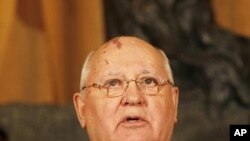Russia’s protest movement continues to move from the Internet to the streets and protesters have won an unexpected ally, the last leader of the Soviet Union.
Mikhail Gorbachev says Russia’s elections on Sunday were unfair, and he is calling on authorities to hold new ones.
Mr. Gorbachev told Russia’s Interfax news agency, “The leadership of the country should admit that numerous falsifications and ballot-box stuffing took place, and that the announced results do not reflect the will of the people.”
The 80-year-old former leader added that “ignoring public opinion discredits authorities and destabilizes the situation.”
In 1990, Mr. Gorbachev won the Nobel Peace Prize for loosening Soviet control over Eastern Europe. But the next year, he presided over the collapse of the Soviet Union, an act that is resented by many Russians today.
But Mr. Gorbachev’s low level of popularity in Russia was not enough for authorities to loosen a total TV blackout on criticism of Sunday’s parliamentary elections.
On Wednesday, police helicopters patrolled the skies of Moscow, police trucks lined city squares, 50,000 police patrolled streets, and security officials said 550 people had been arrested in Moscow protests the night before. But state-run TV channels did not carry a word of this.
Instead, they found time to air features on reindeer tagging in the Arctic, radioactive baby food in Japan, and President Dmitry Medvedev meeting with Cossack leaders.
The only political coverage was a silent video of Prime Minister Vladimir Putin officially registering his candidacy to run for president in the March 4 election.
Analyst Vladimir Tikhomirov, of the Moscow investment house Otkritie, says Mr. Putin now faces an unexpectedly hard election fight. “The activity of the protesters shows that Putin would have a very hard time building up his constituency in the presidential elections," he said.
Knowledge that Mr. Putin could possibly run Russia through 2024 is fueling the protests.
Organizers have scheduled four major protests in Moscow for the next 10 days.
The first one is to be Saturday on Revolution Square, 50 meters from the Kremlin. The permit is for 300 people. But 23,000 people have pledged to go through Facebook and a Russian social networking site. Another 15,000 have said they might go.
Bracing for more protests in Moscow, police towed away cars and placed metal fences around Triumfalnaya Square, the site of one of four attempted protests Tuesday.
With one social networking site promisting nightly protests, police arrested 50 protesters late Wednesday in Moscow and 100 in St. Petersburg.
It also appears to be the provinces' turn, as 1,000 people protested the elections in Kaliningrad, Russia’s western-most territory, a region sandwiched between two European Union countries, Poland and Lithuania.
Nearby, at a European meeting in Lithuania, Russian Foreign Minister Sergei Lavrov rejected election criticism by U.S. Secretary of State Hillary Clinton. Lavrov said she attacked the Russian elections “only to impress her voters in the Democratic Party.”
Even that, criticism of election criticism, was deemed too controversial to make the news on Russia’s state-run TV.
Photo Gallery: Russian Protests




